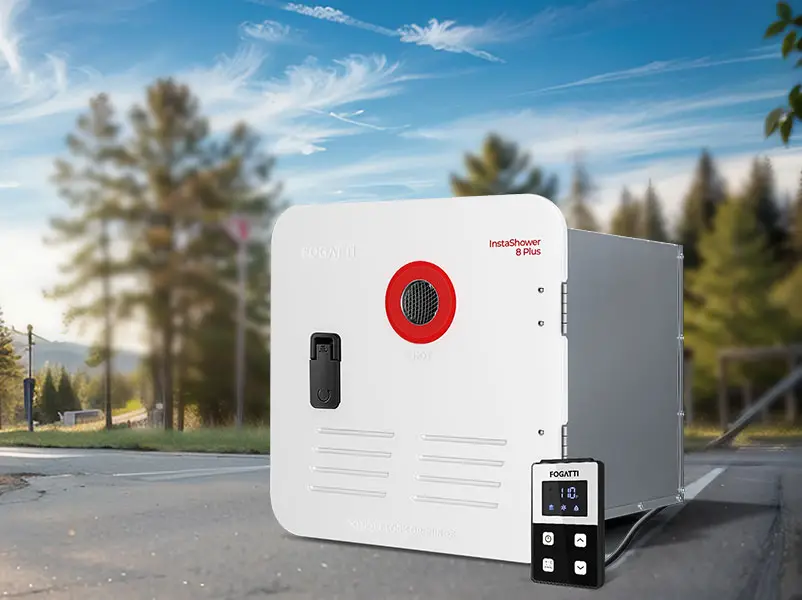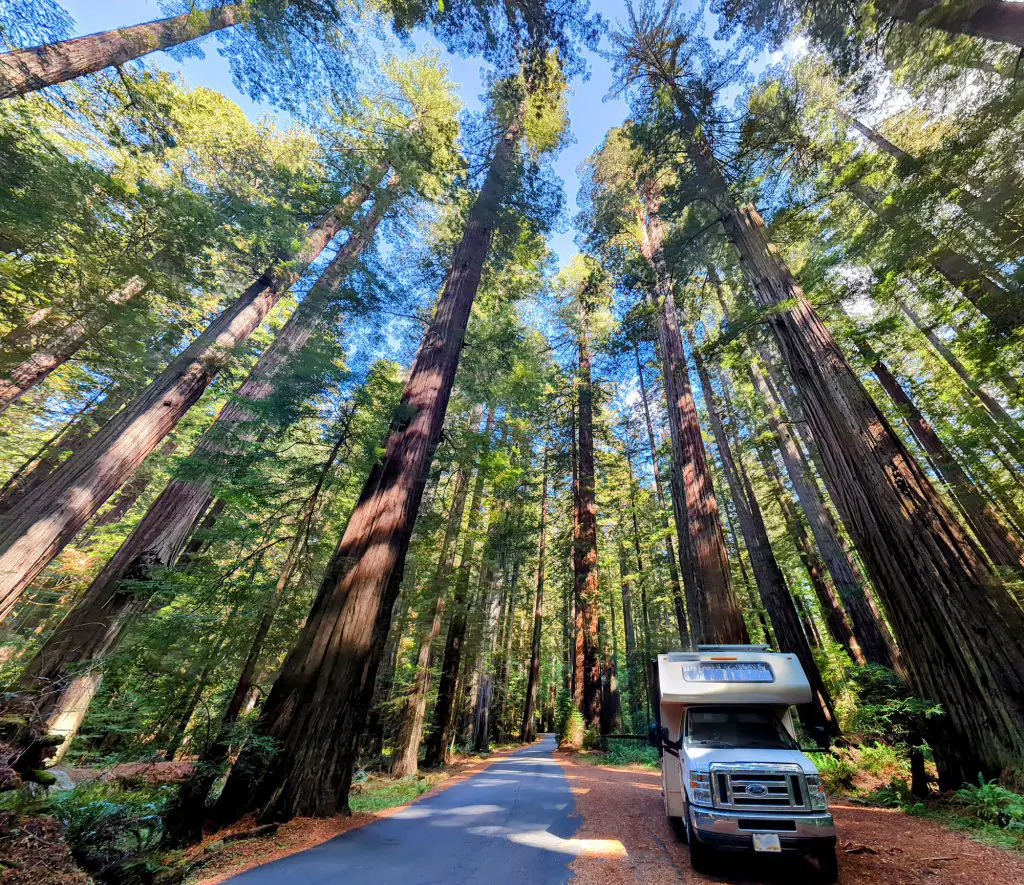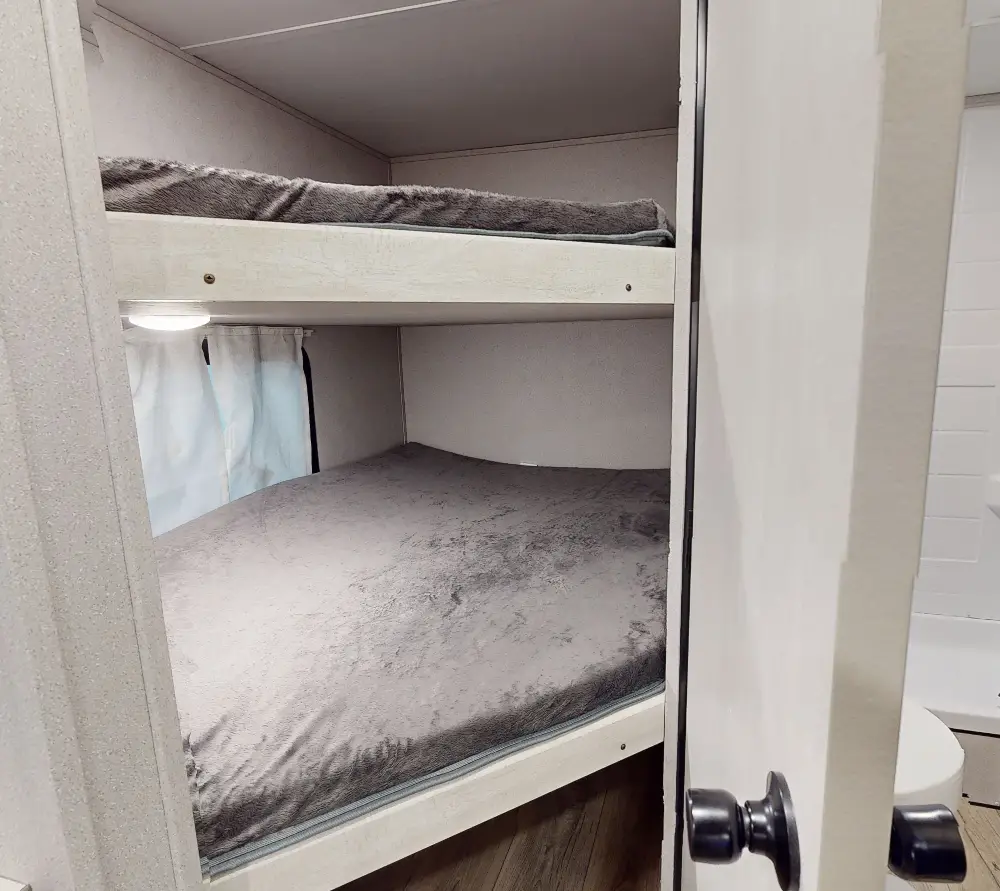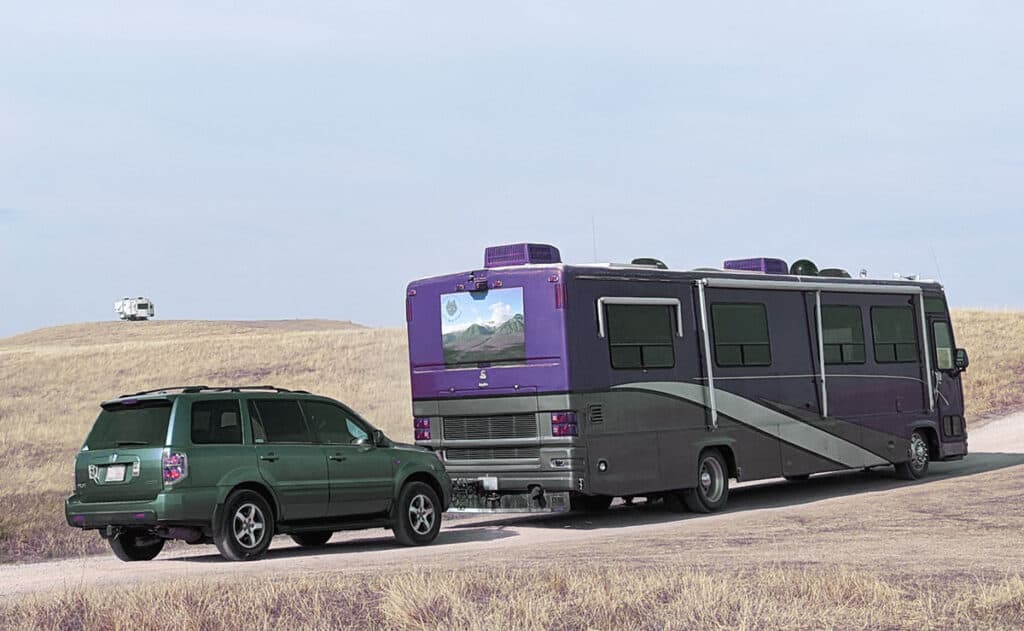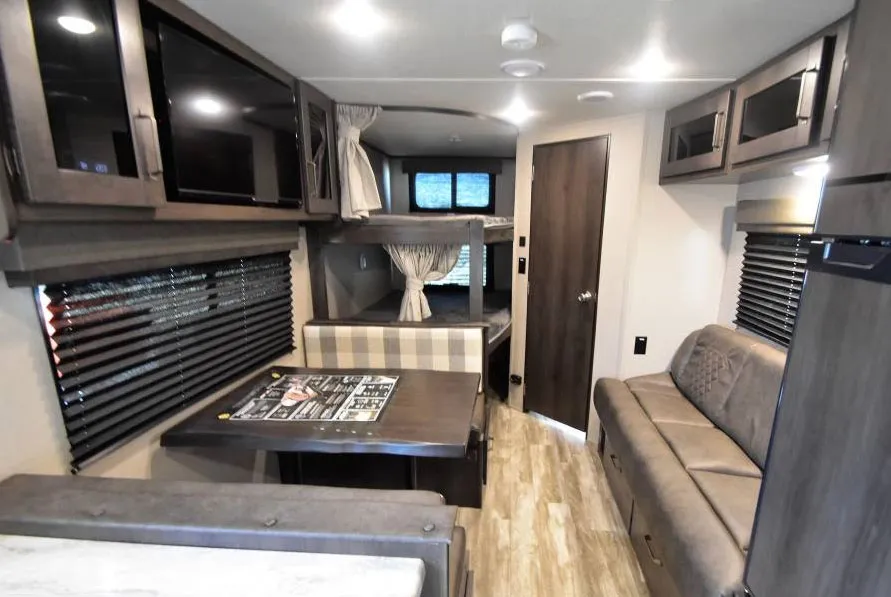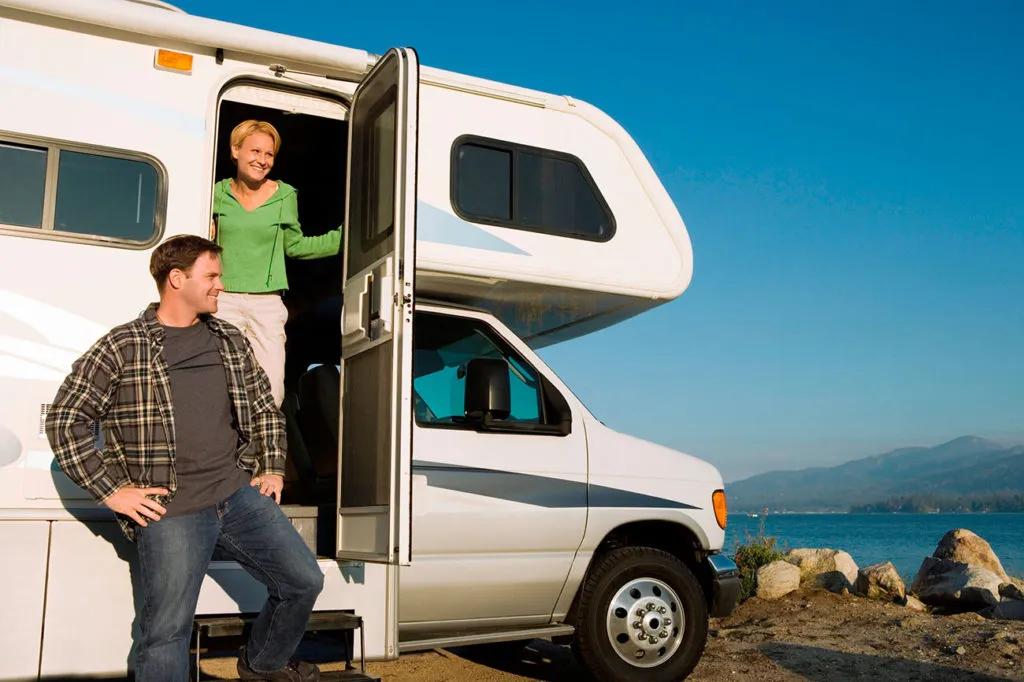Key Takeaways:
- Living in an RV full-time offers freedom, flexibility, and cost savings
- Downsizing and organization are crucial for a smooth transition
- RV living provides unparalleled travel opportunities and reduced living expenses
- Decide whether to sell or rent out your home based on your financial situation
- Costs vary but can range from $1,500 to higher amounts per month
- Choose the right RV size, layout, and features to match your needs
- Stay comfortable with personalized touches, temperature control, and safety measures
- Options for parking include state parks, private campgrounds, and boondocking
- Make friends on the road through RV communities, events, and shared interests
- Consider remote work, freelancing, or online selling for income
- Despite challenges like limited space and campground differences, full-time RV living offers adventure and community.
An Overview of What It’s Like to Live in a Camper Full-Time
The RV lifestyle may seem daunting, but it is becoming increasingly popular for those who seek greater freedom, flexibility, and affordability.
I spend half of the year abroad and when I am in the U.S. I’ve been living in my RV full time. It’s fun but it is not always perfection. Living in an RV full-time can mean waking up to breathtaking views, immersing yourself in nature, and experiencing a simpler and slower pace of life. It means having the ability to travel to new destinations whenever you want, without the hassle of packing and unpacking. It also means having the opportunity to meet new people and fully embrace the local culture.
One of the main advantages of living in an RV is the cost savings, as the monthly expenses can be much lower than in traditional bricks and mortar homes. This is because there are no property taxes, no mortgage, and lower utility bills. Living in an RV also means having the flexibility to move to a new location if you suddenly discover a new place you just have to explore.
It’s important to note that living in an RV full-time requires planning and preparation. You will need to downsize your belongings, carefully choose your RV, and have an idea about how you will earn a living or maintain a remote work schedule while on the road. However, these efforts are well worth it, as the rewards of living in an RV full-time far outweigh the challenges.
Living in an RV full-time provides endless opportunities for adventure and self-discovery. You will learn to be more self-sufficient, resourceful, and adaptive. You’ll gain a new appreciation for the simple things in life and become more attuned to your personal values and passions. So, if you’re ready to embrace the unknown and embark on an unforgettable journey, the RV lifestyle may be just what you’re looking for.
Let’s dive in the basic:
Tips for Making the Transition from Home to Camper Smoothly
Making the transition from a traditional home to a full-time camper can be both exciting and overwhelming. However, with a few tips and tricks, you can make the process as seamless as possible. Here are some suggestions to make the transition from home to camper more comfortable and enjoyable:
Downsize: Living in an RV full-time means living in a smaller space. It’s essential to downsize your possessions before moving into your camper. Be ruthless with your belongings and only take what you need and love. Remember, less is more when it comes to a minimalist lifestyle.
Get Organized: Organization is key when living in an RV. Invest in storage containers and shelves to maximize your space. Keep everything labeled and in its designated spot to avoid clutter.
Plan Ahead: When living in an RV, planning ahead is essential. Research campgrounds, RV parks, and locations you plan to visit ahead of time and make reservations if necessary. Stock up on food and supplies before you get to a place you want to spend some time in.
Embrace Flexibility: Living in an RV means having the flexibility to change your plans at any moment. Embrace the sense of adventure and go with the flow. You may discover some hidden gems along the way.
Stay Connected: Stay connected with friends and family back home by using social media and video chat. Join RV groups and forums to connect with like-minded individuals and gain valuable information.
The Benefits of Living in a Camper – Freedom and Flexibility
There are countless benefits to making your home on wheels. First and foremost is the unparalleled sense of freedom it gives you. No longer tied down to a specific location or dwelling, you have the ability to go wherever the wind takes you. Whether it’s exploring the great outdoors or traveling to new cities, you can pick up and go without the need for extensive planning or booking accommodations.
But it’s not just about the freedom to travel – living in an RV can also greatly reduce your cost of living. Depending on your lifestyle, you might find that living in a camper is significantly cheaper than owning or renting a traditional home. There’s no mortgage or rent to worry about, no utility bills to stress over, and often no property taxes to pay. Plus, many campsites offer affordable rates for long-term stays.
Another major perk of camper life is the flexibility it provides. For starters, your “home” can be as big or small as you want it to be – from cozy teardrop trailers to luxurious motorhomes. Additionally, because you’re not tied down to a specific location or dwelling, you have the ability to change things up whenever you feel like it. Want to move to a new state? No problem. Tired of your current campsite? Switch things up!
So, if you’re someone who is seeking a lifestyle that offers freedom, low cost, and flexibility, living in a camper is definitely worth considering. From the ability to travel wherever you want, to the money you’ll save, to the endless possibilities for change and growth, the benefits of living in a camper are countless.
Sell Your House or Rent It Out – Decide What’s Best for You
Not everyone owns a home. I personally rented a studio apartment before moving into my RV full-time. If you have a home, it’s important to take a good look at your current financial situation and determine if selling or renting out your home is the best option for you. Selling your house can provide you with a lump sum of cash that you can use to invest in your RV lifestyle while renting it out can provide you with a steady stream of passive income.
If you’re leaning towards selling your house, it’s important to keep in mind that the real estate market can be unpredictable. It’s always a good idea to work with a trusted real estate agent who can help you determine the best listing price and market your home effectively. You’ll also want to consider any additional costs associated with selling, such as repairs and closing costs.
Alternatively, if you’re considering renting out your home, it’s important to make sure you’re up-to-date on any legal requirements and regulations in your area. You’ll also want to prepare your home for tenants by either hiring a property management company or ensuring that you have a strong lease agreement in place.
Ultimately, the decision to sell or rent out your home is a personal one that depends on your individual circumstances. We encourage you to take your time and thoroughly evaluate all options before making a decision.
How Much Does It Cost to Live Full-Time in a Camper?
First things first, you’ll need to factor in the cost of the RV itself. The price can vary wildly depending on the class, make, and model you choose. For a brand new class A motorhome, you could be looking at a price tag of $100,000 or more. If you’re willing to go for a used model or a smaller class B or C camper, you could potentially save some serious cash.
Next up, you need to consider the cost of your travel. The beauty of living in an RV is that you have the freedom to travel as little or as much as you want. However, with that freedom comes a price. You’ll need to budget for gas, maintenance costs, and campground fees. The good news is that there are plenty of cheap or even free places to park your RV, so with some research, you can make your travel budget stretch further.
Finally, you need to consider your everyday living expenses. Just because you’re living on the road doesn’t mean you can avoid things like groceries, utilities, and internet. In fact, some of these costs may even be higher when you’re living in an RV, as you may need to pay for water, sewage, and electricity hookups at campgrounds. But, there are plenty of strategies and clever hacks to help cut costs and make your life in an RV more affordable.
Overall, living full-time in an RV can be an affordable and exciting way to live life on the road. I believe if you travel slowly and you already own your camper you can get by on $1500 with all your expenses. The upper limit is the sky. With some careful planning, you can make your RV lifestyle a reality.
Choosing the Right RV for You – Size, Layout & Features
Size:
RVs come in various sizes, from tiny homes on wheels to large motorhomes. When deciding what size RV to choose, you’ll need to consider how many people will be living in it and what kind of activities you’ll be doing. If you’re a solo traveler or a couple, a small camper van or a Class B RV may be perfect for you. However, if you’re looking for more space, a Class A or Class C motorhome may be more suitable for you and your family, offering additional storage and a more comfortable living space. In my experience, your first RV won’t be your last RV.
Layout:
Each RV has a unique layout, and it’s crucial to find one that matches your lifestyle. Whether you’re looking for a layout with a separate bedroom, a spacious kitchen, or an entertaining area, you’ll want to find an RV that aligns with your goals. For example, a fifth-wheel trailer often comes with a separate bedroom space and more open floor plans. On the other hand, travel trailers offer more customizable spaces and tend to have more compact layouts.
Features:
Last but not least, the features of your RV should match your needs and wants. Do you need solar panels for off-grid living? Do you prefer a full-size fridge, oven, or a smaller, more efficient option? Do you need a washer and dryer hookup, or can you manage with a laundromat? These are all crucial considerations when selecting the right RV for your way of living.
By considering factors like size, layout, and features, you’ll find the perfect home on the road that fits your needs and your wallet.
Check out more RV guides Here
Trailer or Motorhome?
If you’re looking for something more affordable, a trailer may be the way to go. They tend to be cheaper than motorhomes and you can tow them with smaller vehicles. Plus, once you set up camp, you can detach the trailer and use your car to explore the surrounding areas.
On the other hand, if you want all the bells and whistles, a motorhome might be a better fit for you. If you don’t want to get out of your car and walk into your home, a motorhome is a better choice. You won’t have a car though you can maybe consider towing one.
Are you looking for more affordability and ease of use? Do you want more safety as you wouldn’t have to get out of the car and walk to your rig? Ultimately, it comes down to your personal preferences and needs.
How to Remain Comfortable While Living in a Camper
Add some personal touches like photos, plants, and candles to create a warm and inviting atmosphere. If you’re worried about space, don’t be afraid to get creative with storage solutions like hanging baskets and under-bed containers.
My needs are having a TV and a good internet connection for entertainment. I took care of both by buying a smart TV and I have multiple internet providers.
Now, let’s talk about temperature control. Depending on where you’re parked, the temperature inside your RV can fluctuate greatly. A great solution is to move with the weather. During the summer you go up North and you in the winter down South. You may or not have an AC built in your RV. You can always invest in a portable air conditioner. I love my two Fantastic Fans that create air movement on warmer days. Most RV furnace systems are not so energy efficient. You can buy a small heater that runs on electricity or propane. This will keep you comfortable no matter the weather outside.
Next up, you’ll want to make sure your RV is adequately insulated. This will keep you warm in the winter and cool in the summer while also preventing any unwanted drafts. Don’t forget about window coverings to decrease heat gain or loss.
Another important factor to consider is water usage. Many RVers utilize a water filtration system to ensure clean and safe drinking water. Additionally, you might consider investing in a water pressure regulator to maintain consistent water pressure and prevent damage to your RV’s plumbing system.
Let’s not forget about safety. Safety is always a top priority. Make sure to have a reliable GPS system and emergency kit on hand, including first aid supplies, extra flashlights and batteries, and a fire extinguisher. I have security alarms and cameras installed in my rig. Take a look at my blog post about RV Safety.
Finally, don’t forget about your health and well-being. Living in an RV can be a bit cramped, so finding ways to exercise and stay active is crucial. Many RV parks have fitness centers, or you could invest in portable workout equipment like resistance bands or a yoga mat.
Where to Park Your Camper – Long-Term And Short Term
Some people travel often and some only a few times a year. There are people who stay in the same location for the long term. If you plan to stay in one place long-term, there are plenty of long-term campgrounds and locations that cater to people just like you. These campsites offer all the amenities you need to live comfortably, from water and electrical hookups to laundry facilities and even WiFi.
I personally like to move more often, sometimes I stay in one place for a couple of weeks and sometimes only a few days. I might just spend a night in a place if I am on the road. The slower you travel less it will cost you.
One popular option for full-time RVers is to stay in state parks and national forests. These areas offer stunning natural beauty, plenty of outdoor activities, and affordable camping rates. Plus, many of these parks have designated RV sites with full hookups, dump stations, and other amenities. This can cost around $10-$80 a night depending on the location.
Another great option is private campgrounds and RV parks. These facilities are often more upscale than state parks, with amenities like swimming pools, hot tubs, and even golf courses. Some of these campgrounds even offer rental cabins and cottages for those times when you want a break from RV living. These can cost anywhere between $40-$120 a night.
If you’re looking for a more rustic experience, boondocking (camping off the grid) might be right up your alley. This option allows you to immerse yourself in nature and enjoy the peace and quiet of secluded areas. Just be sure to have plenty of water, food, and other essentials on hand, since you won’t have access to modern amenities. You can find many Public Lands where you can stay for free for usually up to 2 weeks.
There are also apps like Harvest Host and Boondockers Welcome. These platforms provide RVers with opportunities to connect with welcoming hosts and experience diverse camping locations while keeping costs down. It’s important to note that while the stays are typically free or low-cost, it’s encouraged to support the hosts by making purchases or supporting their businesses during your stay.
Overall, there are plenty of options for finding long-term parking for your RV. See some of the apps I am using for finding overnight locations.
How To Make Friends On The Road?
Join RV communities and forums. There are plenty of online platforms dedicated to RVers of all ages and backgrounds, where you can share your experiences, seek advice, and connect with other full-timers. These communities can be a great source of support and friendship, and you might even find a travel buddy or two!
Secondly, attend RV events and gatherings. All across the country, there are rallies, meetups, and festivals designed for RV enthusiasts. These events are a fantastic opportunity to meet new people, swap stories, and bond over your shared love of the open road. Plus, you might discover some new travel destinations or learn some handy tricks of the trade!
Another great way to make friends on the road is to seek out hobbies and activities that interest you. Whether it’s hiking, kayaking, painting, or playing music, there are plenty of opportunities to indulge in your passions while on the go. Joining a local hiking group or attending an open mic night at a nearby coffee shop can be a wonderful way to meet new people and make meaningful connections.
Finally, don’t be afraid to strike up a conversation with your fellow RVers at the campground or RV park. You never know who you might meet and what kind of connection you could forge. Remember to be friendly, approachable, and open-minded, and you’re sure to make some lifelong friends on the road.
Making money while living in an RV full-time – how to make ends meet
One option for making some extra cash is to find a remote job in your field or a similar one. Many companies these days are open to hiring remote workers, and all you need is a reliable internet connection to get started. So, if you have a passion for writing, graphic design, or any other freelance services, this could be a great way to earn money while enjoying the RV lifestyle.
Additionally, you could always try your hand at selling handmade crafts or vintage items online. With sites like Etsy and eBay, it’s never been easier to set up an online shop and start selling your unique creations to people all over the world. Plus, the RV life can be a great source of inspiration for your creative projects.
Most Popular Remote Jobs For Full-Time RVers
Ways To Find Remote Jobs To Live Your RV Life Free
How To Teach English Remotely While Living Your RV Life?
How Do You Get Internet?
When it comes to remote work from an RV, having multiple internet providers is essential, albeit it can be a significant expense. Verizon and AT&T are popular choices, offering excellent coverage from various locations. Depending on your needs and budget, you can select from a range of plans, including those with unlimited data to avoid concerns about overages.
To access your data plan while on the road, using your smartphone as a hotspot is one option. It enables you to share your phone’s data connection with other devices like tablets and laptops. However, if multiple individuals require internet access simultaneously, investing in a dedicated hotspot device may be beneficial.
Another notable option is Elon Musk’s Starlink, a satellite internet service available in numerous locations worldwide. I have personally used Starlink for over a year and have found it reliable. They offer a package specifically designed for RV travelers, priced at $150 per month. With Starlink, you can stay connected even in the most remote locations, as long as there is an unobstructed view of the sky.
Considering these options, you can choose the best combination of providers and plans that align with your specific needs and ensure a dependable and accessible internet connection while working remotely from your RV.
RV Internet Options – 5 Ways I Get Internet In My RV
Living the Dream – The Pros and Cons of Full-Time RV Living
Pros
Full-time RV living offers endless opportunities for adventure and travel. You have the freedom to pick up and go wherever your heart desires. With each new destination, you can experience new cultures and outdoor activities. Additionally, living in an RV can save you money. You don’t have to worry about mortgage payments or rent, property taxes, or utility bills. Plus, you’ll have fewer possessions, so you’ll spend less on material goods. And let’s not forget the community of like-minded RVers you’ll discover along the way. You’ll have the chance to meet new people and make lifelong friends.
Cons
One of the most significant drawbacks is the lack of space. Living in an RV requires significant downsizing and adjusting to living in a small space. Additionally, you’ll need to keep in mind that not all campgrounds and RV parks are created equal. Some offer limited amenities, while others have restrictions on pets and the size of your rig. It’s important to do your research ahead of time to ensure you find the best fit for your lifestyle. It can also cost you if you need need lots of RV maintenance. It makes it hard that you are living in your RV.
Ending Thoughts
Although living in a camper full-time is definitely not for everyone, if it’s something that you think you could enjoy, then I absolutely recommend giving it a go. It’s hard work but extremely rewarding, from the creative process of making your “home on wheels” to the joy of traveling around with all your belongings.
Take it slow if needed and set some ground rules for yourself so that you have the support necessary for a successful transition into camper life. If you take the right precautions and prepare thoroughly, living in a camper full-time can be an incredibly enriching experience. So wherever you go, whatever adventures await: never forget to enjoy every moment with an eye towards the future!



